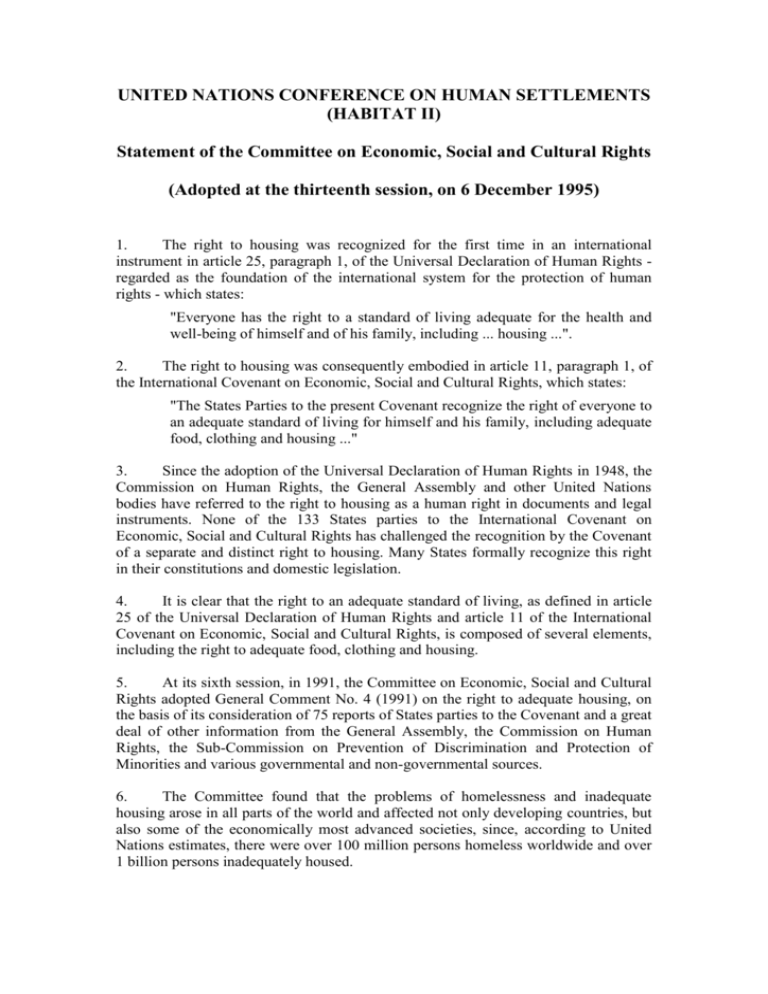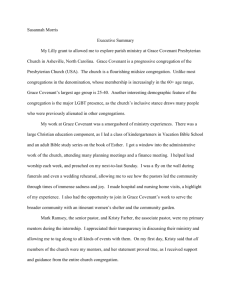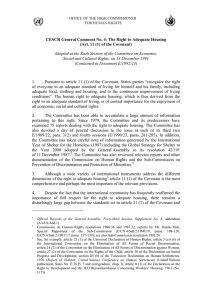united nations conference on human settlements (habitat ii)
advertisement

UNITED NATIONS CONFERENCE ON HUMAN SETTLEMENTS (HABITAT II) Statement of the Committee on Economic, Social and Cultural Rights (Adopted at the thirteenth session, on 6 December 1995) 1. The right to housing was recognized for the first time in an international instrument in article 25, paragraph 1, of the Universal Declaration of Human Rights regarded as the foundation of the international system for the protection of human rights - which states: "Everyone has the right to a standard of living adequate for the health and well-being of himself and of his family, including ... housing ...". 2. The right to housing was consequently embodied in article 11, paragraph 1, of the International Covenant on Economic, Social and Cultural Rights, which states: "The States Parties to the present Covenant recognize the right of everyone to an adequate standard of living for himself and his family, including adequate food, clothing and housing ..." 3. Since the adoption of the Universal Declaration of Human Rights in 1948, the Commission on Human Rights, the General Assembly and other United Nations bodies have referred to the right to housing as a human right in documents and legal instruments. None of the 133 States parties to the International Covenant on Economic, Social and Cultural Rights has challenged the recognition by the Covenant of a separate and distinct right to housing. Many States formally recognize this right in their constitutions and domestic legislation. 4. It is clear that the right to an adequate standard of living, as defined in article 25 of the Universal Declaration of Human Rights and article 11 of the International Covenant on Economic, Social and Cultural Rights, is composed of several elements, including the right to adequate food, clothing and housing. 5. At its sixth session, in 1991, the Committee on Economic, Social and Cultural Rights adopted General Comment No. 4 (1991) on the right to adequate housing, on the basis of its consideration of 75 reports of States parties to the Covenant and a great deal of other information from the General Assembly, the Commission on Human Rights, the Sub-Commission on Prevention of Discrimination and Protection of Minorities and various governmental and non-governmental sources. 6. The Committee found that the problems of homelessness and inadequate housing arose in all parts of the world and affected not only developing countries, but also some of the economically most advanced societies, since, according to United Nations estimates, there were over 100 million persons homeless worldwide and over 1 billion persons inadequately housed. 7. The Committee’s General Comment No. 4 (1991) identified some of the principal issues which relate to this right: In the first place, the right to adequate housing applies to everyone, without restriction or distinction based on age, sex, family or economic status, group or other affiliation or social status; It should not be interpreted in a narrow or restrictive sense. It must not be equated with a right simply to informal shelter, but has to be interpreted as a right to live somewhere in security, peace and dignity according to the principles governing the Universal Declaration of Human Rights and the Covenant itself. As the Commission on Human Settlements has stated, adequate shelter means adequate privacy, adequate space, adequate security, adequate lighting and ventilation, adequate basic infrastructure and adequate location with regard to work and basic facilities all at a reasonable cost. 8. According to this interpretation, and on the basis of the concept of adequacy, which alone makes it possible to determine whether a type of shelter may be regarded as "adequate housing" within the meaning of article 11, paragraph 1, of the Covenant, the Committee identified the criteria that must be taken into consideration in any particular context. They include the following: Legal security of tenure, which guarantees legal protection against eviction, harassment and any other threat; Availability of services, materials, facilities and infrastructure to guarantee health, security and comfort in dignified conditions; Affordability: The financial cost of housing should be at such a level that the satisfaction of other basic needs is not threatened or compromised; Habitability, i.e. the guarantee of protection from inclement weather and risks of disease, as well as of physical safety; Accessibility, particularly for disadvantaged and vulnerable groups, which should be ensured some degree of priority in connection with housing; Location, which must facilitate access to employment options and basic social services and be far from pollution sources that are harmful to health; Cultural adequacy. 9. The right to adequate housing must be viewed in the light of the other basic rights provided for in the International Bill of Human Rights and other international instruments, including the right to freedom of association, the right to privacy and the principle of non-discrimination. 10. It is on this basis that the States parties to the International Covenant on Economic, Social and Cultural Rights have submitted their reports to the Committee, fully aware that ratification obliged them to take immediate measures to promote the right to housing and, where necessary, to seek international cooperation, in accordance with articles 11, 22 and 23 of the Covenant. 11. The Committee’s recommendations in this respect have encouraged States parties, regardless of their economic situation, to establish a national housing strategy, formulated to the fullest extent possible after thorough consultations and with the participation of all concerned, notably the homeless, persons with inadequate housing and their representatives, and regularly to monitor the development of the housing situation. In both cases, this is an obligation with immediate effect, especially as regards the situation of vulnerable groups: persons or families who are homeless or living in inadequate housing or in "illegal" settlement areas, persons who have been forcibly evicted and low-income groups. 12. The measures that must be taken by States may combine measures originating from the public sector and from the private sector, but States must above all be encouraged to support self-sufficiency strategies, while fulfilling their own obligations to guarantee respect for the rights of each individual, as soon as possible and in the light of available resources. In many countries, experience has shown that organized vulnerable groups have been able, with minimum State assistance, to undertake construction better suited to their needs and less costly than construction directly undertaken by the public sector. 13. The question of the "enforceability" of the right to adequate housing is beyond doubt, and many elements constituting this right are already the subject of domestic remedies in most of the States parties to the Covenant: this is notably the case with judicial remedies against evictions or demolition; applications for compensation or rehousing following illegal eviction; complaints against illegal measures taken by owners, whether public or private, or with their support; judicial actions against discriminatory measures in the area of housing; complaints against owners concerning health hazards or the inadequacy of housing, or excessive rent; and judicial actions concerning land ownership. 14. This list is not exhaustive, and assertion of the right to housing in the courts, based on the implementation of domestic legislation or the Covenant, has assumed considerable importance in many countries. In the light of the substantial increase in the number of homeless persons, collective action is growing steadily, not only in the developing countries, where it often manifests itself through the occupation of undeveloped land, but also in the rich countries, where it takes the form of occupation of public or private premises which have been kept empty with the sole aim of speculating on the value of the buildings in question. 15. In this connection, the Committee considers that instances of forced eviction are, prima facie, incompatible with the requirements of the Covenant and can be justified only in the most exceptional situations and in accordance with the relevant principles of international law. 16. On the occasion of its examination of reports, the Committee has recommended to all States parties that they should avoid unjustified mass evictions and, in any event, limit them to the strict needs of public order; in these cases alone, they should carry them out only in consultation with the persons concerned, making provision for appropriate rehousing measures, avoiding the use of force and, in all cases, compensating the victims in order to reduce the adverse consequences to a minimum. 17. In its resolution 1993/77, the Commission on Human Rights itself affirmed that the practice of forced eviction constituted a gross violation of human rights, in particular the right to adequate housing, and urged Governments to undertake immediate measures, at all levels, aimed at eliminating this practice. 18. At a time when the International Covenant on Economic, Social and Cultural Rights is being ratified by a growing number of States (133 to date) and when international provisions for the protection of human rights, in particular the right to adequate housing, are increasingly being incorporated in domestic legislation, the view that the right to adequate housing is a human right can no longer be seriously challenged. 19. This right concerns the dignity of human beings - men, women and children and it is provided for in many international instruments for the protection of human rights, chief among them the International Covenant on Economic, Social and Cultural Rights. 20. The decision by the Commission on Human Settlements to take up, at the United Nations Conference on Human Settlements (Habitat II), the theme "Adequate Shelter for All" and the multisectoral questions relating thereto is in line with the rationale which inspired the Universal Declaration of Human Rights, the International Covenant on Economic, Social and Cultural Rights and, recently, the World Conference on Human Rights. 21. The reaffirmation by the United Nations Conference on Human Settlements (Habitat II) that the right to adequate housing is a fundamental human right is, for the Committee and for the international community as a whole, of considerable importance in terms of access to human dignity for the greatest number.










